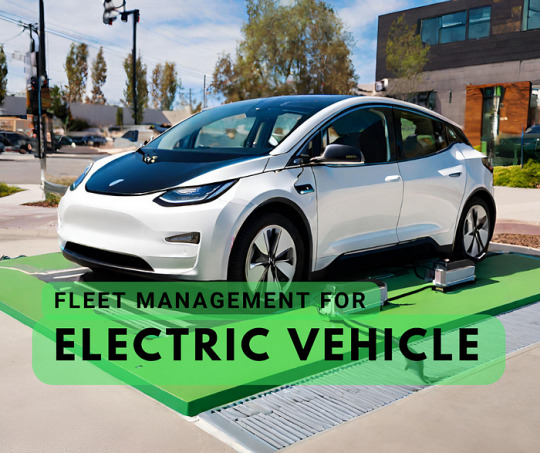Don't wanna be here? Send us removal request.
Text
EV Fleet Management - For Good Health of Your EV

In today’s rapidly evolving automotive landscape, the electrification of fleets has become a key focus for businesses looking to reduce their carbon footprint, cut operational costs, and stay ahead in the race for sustainability. As electric vehicles (EVs) gain traction, fleet managers must adapt and implement best practices to maximize the benefits of this eco-friendly transition. In this blog, we will explore the best practices in electric vehicle fleet management, providing valuable insights to navigate the road ahead.
Embrace Data-Driven Decision Making
To successfully manage an electric vehicle fleet, data is your greatest ally. Implementing telematics systems and vehicle tracking solutions is crucial for gathering real-time data on your EVs’ performance. By monitoring factors such as battery health, charging patterns, and driving behavior, you can make informed decisions that optimize fleet efficiency.
Key Takeaways:
- Leverage telematics systems for real-time data.
- Analyze data to identify opportunities for optimization.
- Use predictive maintenance to reduce downtime.
Strategically Plan Charging Infrastructure
One of the unique challenges of managing an electric fleet is ensuring access to charging infrastructure. To prevent range anxiety and maintain operational efficiency, you must strategically plan charging station locations. Consider factors like vehicle routes, charging speeds, and energy sources to minimize downtime and keep your fleet moving.
Key Takeaways:
- Invest in fast-charging infrastructure for quick turnaround.
- Utilize renewable energy sources to enhance sustainability.
- Create a charging schedule that aligns with fleet needs.
Train and Educate Drivers
The transition to electric vehicles often requires a shift in driver behavior and habits. Training and educating your drivers on EV operation and EV Charging Software can significantly impact your fleet’s overall performance. Encourage eco-friendly driving behaviors such as regenerative braking and smooth acceleration to extend battery life and reduce energy consumption.
Key Takeaways:
- Conduct comprehensive EV training for drivers.
- Emphasize energy-efficient driving techniques.
- Promote responsible charging practices.
Optimize Fleet Size and Composition
Electric vehicles may have different operational characteristics compared to traditional vehicles. Therefore, it’s essential to reevaluate your fleet’s size and composition. Assess your organization’s specific needs and consider the most suitable mix of EVs and conventional vehicles to achieve your goals.
Key Takeaways:
- Conduct a thorough fleet analysis.
- Right-size your fleet to match your operational requirements.
- Consider a gradual transition for cost-effectiveness.
Implement Preventive Maintenance
To ensure the longevity and reliability of your electric vehicle fleet, proactive maintenance is critical. Develop a comprehensive preventive maintenance program that includes regular checks of battery health, electrical systems, and charging equipment. This practice will help you avoid costly breakdowns and maximize uptime.
Key Takeaways:
- Schedule routine maintenance for all EVs.
- Address issues promptly to prevent downtime.
- Partner with qualified technicians experienced in EV servicing.
Monitor Regulatory Changes and Incentives
The regulatory landscape surrounding electric vehicles is continuously evolving. Stay informed about local and national regulations, tax incentives, and subsidies that can benefit your fleet. By taking advantage of available incentives, you can reduce the total cost of ownership and accelerate your ROI on electric vehicles.
Key Takeaways:
- Stay updated on EV-related regulations.
- Explore available incentives and grants.
- Factor incentives into your financial planning.
Embrace Sustainability Reporting
In today’s environmentally conscious world, sustainability reporting is not just a trend — it’s a necessity. Showcase your commitment to sustainability by transparently reporting on your fleet’s emissions reductions, energy savings, and environmental impact. This not only builds trust with stakeholders but also sets your business apart as a responsible industry leader.
Key Takeaways:
- Develop a sustainability reporting framework.
- Highlight the positive environmental impact of your electric fleet.
- Engage with stakeholders and customers on your sustainability initiatives.
Conclusion
As electric vehicles continue to reshape the future of fleet management, businesses must adapt and implement best practices to thrive in this transformative era. By embracing data-driven decision making, strategically planning charging infrastructure, educating drivers, optimizing fleet size, implementing preventive maintenance, monitoring regulations, and embracing sustainability reporting, you can navigate the road ahead with confidence.
Incorporating these best practices will not only reduce your carbon footprint but also lead to cost savings, improved operational efficiency, and a competitive edge in a rapidly evolving market. The future of fleet management is electric, and by following these guidelines, you’ll be well-prepared to steer your organization toward a sustainable and prosperous future.
Resource: Numocity.com
Resource: Medium.com
#electric vehicles#fleet management#ev charging#ev software#numocity#fleet management software#electric car charging software#e-mobilty charging
0 notes